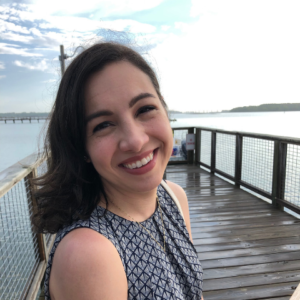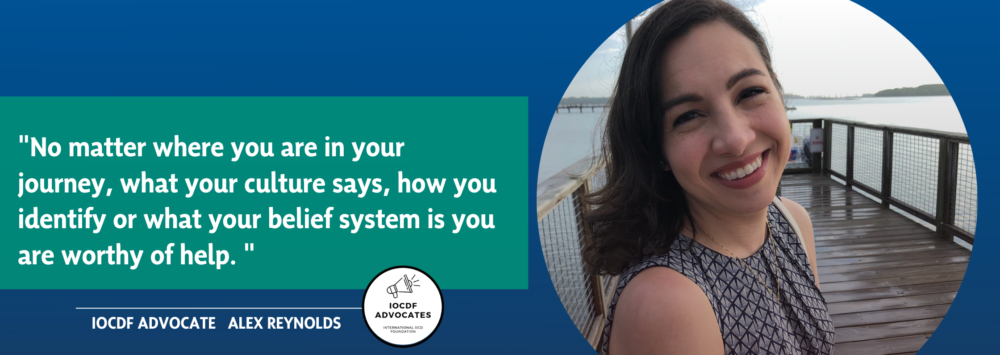Meet IOCDF Advocate Alexandra Reynolds! Alex shares the reasons why she became an IOCDF Advocate. Learn more about our advocate program.
There are many reasons I became an advocate, but my biggest passion lies in creating a safe and welcoming space for the Latinx/Hispanic and BIPOC communities. As a First-Generation Latina, I often felt alone in my struggles with OCD and Major Depression. Historically, in my culture, therapy is regarded as something shameful or an admission of weakness. It’s not easy to be the first in your family to break with tradition and receive mental health treatment. I want to be there for other Latinx and BIPOC sufferers. To help them feel seen and find their own voices on their journeys.

OCD has had a deep and lasting impact on my life. It has been with me in some form or another since the age of six. Before receiving treatment, obsessions and compulsions were such a large part of my life that I thought they were simply aspects of my personality. I struggled off and on in school from an early age due to checking, just right compulsions, and avoidance. I exhibited extreme anxiety around my health, flying and driving. As I got older, I found ways to cope and white-knuckle my way through college and work, but it was exhausting and I found myself ashamed and confused that I couldn’t function the way others did.
It took me thirty years to get the appropriate treatment for my OCD and Major Depression because of the stigma and misunderstanding that still plagues OCD and other mental illnesses. During those thirty years, the shame and guilt that I felt because I couldn’t just get over my fears or fix my behaviors, as I was told I should, led me into deep episodes of Major Depression. I attempted suicide twice because I felt the pain of living with my mental illness and not being heard was too great. My experience isn’t unique. According to the IOCDF, it takes about 14-17 years for a person with OCD to receive effective treatment. That is far too long to live in silence with a debilitating and life-altering mental illness. I want this to change. I don’t want others to suffer in silence and shame until they simply can’t take it anymore. No one should feel ashamed, discouraged or stigmatized for seeking life-saving treatment. No one should have to hit rock-bottom before they reach out for help.
I can honestly say that what changed the trajectory of my life was finding a kind, affirming and skilled Exposure and Response Prevention specialist and learning to trust him enough to do the hard work and get better. Without the tools I learned in therapy I would still be white-knuckling my way through life. It didn’t come easy. Finding a therapist who is a good fit can take time and ERP is really hard work, but the pay-off is completely worth it.
No matter where you are in your journey, what your culture says, how you identify or what your belief system is you are worthy of help. You are deserving of a beautiful and fulfilling life. It can be so difficult to take the step to ask for help, but you are worth it and it’s one of the most courageous things you can do. OCD knows how to make us suffer. It can take away so much, but with the right tools we have the power to take our lives back and create something more beautiful than we ever imagined.
OCD is a huge part of my life and so is advocacy, but I am so much more than that. I am a wife, Mom, dog Mom, sister, friend and life-long learner. I love all things psychology and literature and, when time allows, enjoy reading a great book. I love cooking, hiking, running and nurturing my creative side through drawing and painting. Perhaps most importantly, I will never turn down a good adventure. Especially if there is a beach involved.
If you are ever feeling suicidal or unsafe please go to your local emergency room, call 911 or call the suicide prevention hotline at 800-273-8255.


Leave a Reply